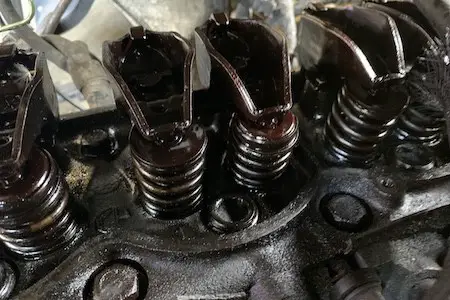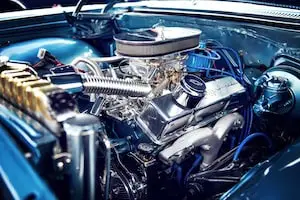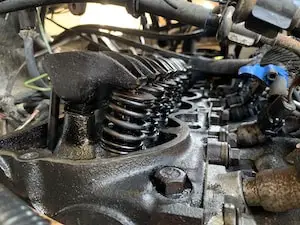I found myself attempting my first engine rebuild a few years ago with no guide other than my car manual and google. All of the answers to my questions came from my hours of searching the internet and asking mechanic savvy friends as well as professional mechanics.
Should I put Anti-seize on head bolts?
Anti-seize is not recommended for application to head bolts for most engines. If anti-seize is used, the torque readings can be drastically altered. It is recommended for almost all engines to use a thin coat of motor oil as a lubricant for head bolt installation.
The best thing to apply is motor oil and there are several reasons for this but it is not the only lubricant you can use. There are a few alternatives such as ARP Fastener Assembly lubricant, and Permatex No.3 lubricant and I will explain all three of these options and then dive into why motor oil is your best option.

Lubricants for Head Bolts
Motor Oil
Motor oil is always recommended and unless specified otherwise by the manufacturer, you should apply a thin coat of motor oil to the threads before assembly and torque to manufacturer specs.
What weight motor oil should I use to lubricate threads?
Use the same weight of oil that you plan to put into the engine when it is reassembled. Any weight engine oil will do. Conventional or synthetic is fine, but to avoid having to purchase more motor oil, just use what you have on hand.
ARP Fastener Assembly Lubricant
Head bolts and main bolts are designed to withstand enormous amounts of force. The bolts use actually stretch out as you torque them to spec. In order to put the least amount of strain on these bolts it is a good idea to replace them and to use a high quality assembly lubricant if you desire.
This is generally recommended for high performance builds but is a quality product used by many engine builders.
ARP Fastener Assembly Lubricant is applied to the threads of a bolt and its purpose is to provide just the right amount of lubrications so that the torque applied is accurate and is maintained from that point forward.
A key note to make here is that because a lubricant is applied, the amount that your car manual indicated for you to torque the bolts to may change. ARP Assembly Lubricant is a good choice because they have good customer service as well as easy to read guides on what to adjust the torque specs to.
It is such a popular choice because of how little it alters the torque readings upon installation.
Permatex No. 3 Sealant
Permatex No. 3 sealant is a high quality sealant that can be used to install head bolts. It will keep your torque readings accurate and aid in preventing damage to your head bolts.
This is a slow drying non hardening sealant that is resistant to oil, gasoline, and grease. A great option for head bolts.
It is intended to be used on close-fitted machined surfaces and comes in an easy to use brush-on type container.
Torque spec alterations are not provided by Permatex which makes it the next choice in line after ARP’s sealant
The Best Lubricant for Head Bolts
Bottom line is the pros do not install head bolts dry and you shouldn’t either. Use motor oil since you have it on hand and will get the job done right, or do it extra well and pick up some ARP Thread Sealant or Permatex No. 2 Sealant.
Motor oil is a choice made by most professionals and will certainly get the job done without the need to spend more money or worry more about what product to use.
But there are still a few steps involved in replacing head bolts.
Preparation of Head Bolts for Installation
Now you know you should apply your lubricant of choice to the threads of the head bolts but there are a few other steps to keep in mind that should be done before applying the lubricant.
These are a few recommendations from manufacturers and the professionals when installing head bolts:
- Clean the threads of the bolt
- Use a wire brush or a rag with any type of solvent
- Inspect the bolts and if there is significant wear or any corrosion, replace them. They are inexpensive.
- Chase the threads of the hole with a tap
- This will remove any unwanted debris especially and metal shavings or burs inside the hole
- Blow out the bolt holes with compressed air. This does a great job of clearing out any loose debris
- Especially if you cannot get your hands on a tap the right size, then be sure to blast the hole with some air.
- Follow the torque specs provided by the manufacturer.
Other Related Questions
I asked the machine shop many questions and probably made them wish I had just paid them to rebuild the engine, but I had time, the desire to build my own engine, and did not have the money to spend! Point is, I was where you are now, about to bolt the head back onto the engine block and wondered, what do I need to put on the head bolts before installation? You may have some of the following questions that I had at that time:
Can I tighten head bolts dry?
It is not recommended to torque head bolts dry because as a bolt is tightened, the threads can create burs causing additional friction. The additional friction reduces the amount of force that is retained in the tightened bolt. To prevent damage to your head bolts, apply motor oil to the threads before installation.
Should I replace my head bolts?
Head bolts should be replaced every time they are used. There are okay to reuse as long as they are not stretch bolts. However they are inexpensive and are a good idea to replace when you are reinstalling the head.
Head bolts are put up against tremendous amounts of force and actually stretch when they are torqued. If there is any sign of wear or corrosion then definitely the bolts should be replaced.
The extremely knowledgeable mechanics over at Engine Builder Mag recommend using new head bolts on every installation.
https://www.enginebuildermag.com/2012/10/ten-head-bolt-installation-tips/Recommend
Using new, quality bolts, will insure that they torque to specs and stay there.
Where Should I Apply Anti-Seize on my car?
Anti-seize should be applied in places such as your exhaust and intake manifolds where heat and water create an environment prone to corrosion. For an in depth guide of when to use Copper Anti-seize, read about it here.


